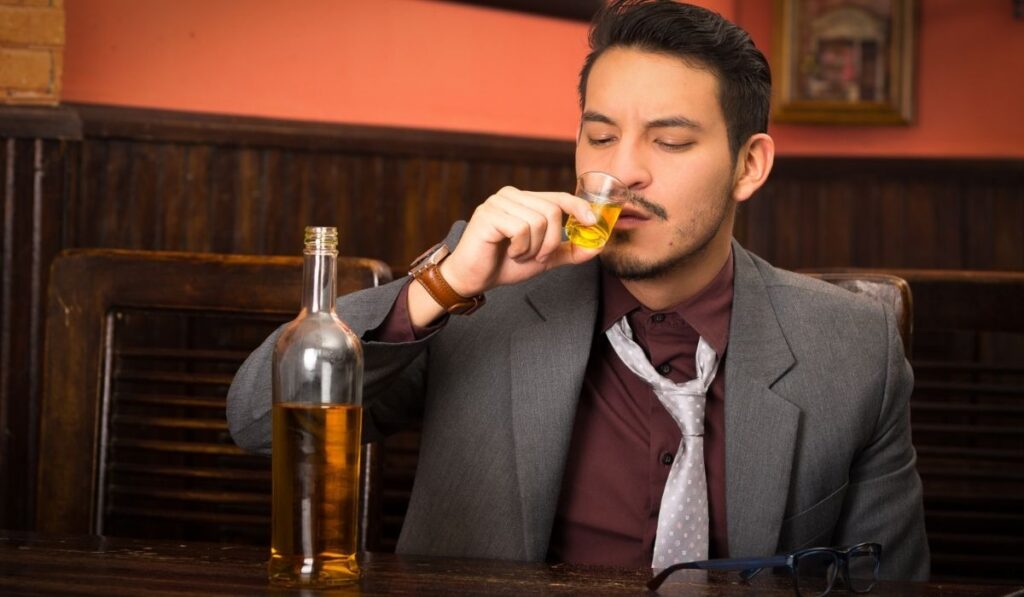As you probably already know, large amounts of alcohol can lead to adverse health complications, like heart disease and stroke. However, you don’t often hear about how even light alcohol consumption can damage your teeth and gums.
Alcoholic beverages and mixed drinks can damage your teeth if you aren’t careful. This is because alcohol can contain high amounts of acid and sugar, both of which can erode your tooth enamel, leading to decay, sensitivity, and other health concerns.
If you’re performing proper oral hygiene and drinking in moderation, you might not experience dental decay. However, you can employ easy tips and tricks to keep your mouth healthy and smile bright.
How Does Alcohol Affect Your Teeth?

Too often do we consider the adverse effects of alcohol to be reserved for those with alcohol use disorder. It’s no surprise that heavy alcohol consumption can lead to tooth decay, gum disease, mouth sores, and other adverse health consequences.
However, even light to moderate alcohol consumption can negatively impact your teeth. Let’s look at some of the ways alcohol can affect teeth:
Softened Teeth Enamel
Your enamel is the thin coating on the top of your teeth. Alcohol, like other drinks high in sugar and acidity, can damage your enamel. Beverages high in acidity damage, weaken, and erode teeth over time — and enamel decay results in sensitive teeth, decay, and other health issues.
Stains and Discoloration
Dark-colored alcoholic beverages such as bourbon and red wine can leave stains on your teeth. The various hues of spirits result from chromogens. Chromogens can attach to your enamel and stain teeth in the process.
Dry Tongue and Mouth
Alcohol can dry out the whole body, including the mouth and tongue. You’re more at risk for developing plaque, deterioration, and harmful bacteria when your mouth is dry. These factors can cause tooth decay, gum disease, and other adverse effects. Furthermore, a dry mouth can lead to bad breath.
Which Alcohol Is Least Damaging to Teeth?
There’s always a lesser evil, even when it comes to alcohol. The general rule of thumb is that dark-colored spirits can cause more stains and damage to your teeth. Here are some better alcoholic beverages to keep in mind when you’re at the bar.
Beer
Are you surprised that beer is less damaging to your teeth? Beer has less acidity and more water than other alcoholic drinks. These factors mean beer is less likely to cause erosion, cavities, and other adverse consequences. For the best results, drink lighter beer options such as pale ales.
Gin, Tequila, and Non-Grain Vodkas
Gin, tequila, and non-grain vodkas will cause minor damage to your teeth and enamel. These spirits have lower acidity ratings than other beverages.
Gin has the lowest acidity rating amongst the bunch, while tequila has the highest. Consider mixing these beverages with tonic or soda water to avoid harmful sugars or additives.
Brut Champagne
Who doesn’t love a good glass of Champagne? However, it may be best to stick with Brut Champagne. Brut Champagne has a lower sugar content than extra-dry varieties.
High amounts of sugar can damage your teeth. When you drink sugar, it starts to interact with the bacteria in your mouth, creating acid. The acid begins to erode your enamel, resulting in cavities and decay.
How to Prevent Alcohol Damage to Your Teeth

There are ways to prevent damage to your teeth regardless of whether you’re a light, moderate, or heavy drinker. Here are some tips you can use the next time you’re out on the town or enjoying a beverage.
Practice Moderation
Heavy alcohol consumption has been connected to various oral health issues, as we mentioned above. Heavy drinkers can suffer from oral cancer, gum disease, tooth decay, canker sores, and other adverse health complications. Practicing moderation is one of the best ways to keep your mouth and teeth healthy.
Sip Through a Straw
Be sure to request a straw the next time you’re at a bar or nightclub. Drinking through a straw or a sipper reduces the harm to your teeth. This is because straws and sippers stop sugary and acidic beverages from hitting your teeth directly. The less exposure your teeth have to these harmful beverages, the better.
Avoid Sugary Cocktails and Mixers
Try to avoid cocktails or spirits with high amounts of sugar, sweeteners, or mixers. Although a fruity cocktail can be incredibly flavorful, the sugar and acids can damage your teeth. When you consume sugar, it starts to interact with the bacteria in your mouth, creating acid.
The acid can damage, weaken, and erode your enamel over time. Damaged tooth enamel can lead to sensitivity and even gum decay.
Rinse With Water Between Drinks
Consider swishing some water around your mouth the next time you’re at a bar or enjoying a drink at home. Alcohol can dry out your mouth, resulting in more bacteria growth.
Not only will swishing water keep you hydrated, but it will help balance the bacteria and pH levels in your mouth.
Brush Regularly and Practice Good Oral Hygiene
The best way to minimize enamel damage is to brush regularly and maintain good oral hygiene. Brushing and flossing consistently can help reduce the risk of stains, decay, and adverse health complications.
Be sure to visit your dentist once every six months for a regular check-up. Your dentist will look for signs of tooth decay or gingivitis and provide you with a treatment plan.


